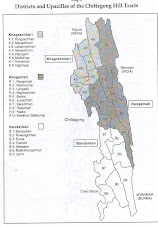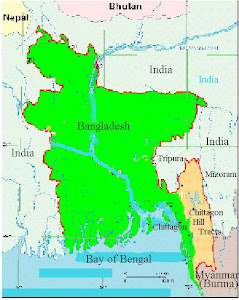Shantimoy Chakma, from Hupbang, Barkal, Rangamati and Monirul Islam Monu, Bandarban
Source from:-http://www.thedailystar.net/story.php?nid=22891
People in remote areas of Rangamati and Bandarban in Chittagong Hill Tracts (CHT) are facing a severe food crisis following the recent invasion of rats on their jhum crop fields.
Indigenous people in Chhotomerung, Ramghar, Dighinala, Panchhari, Guimara Laxmichhari of Khagrachhari, Thanchi, Alikadam, Lama, Ruma and Nikhiyangchhari in Bandarban have been passing days practically half-fed and many of them are living on jungle potato.
According to the Department of Agricultural Extension (DAE), 766 families in Bandarban--363 in Ruma upazila, 295 in Thanchi and 108 in Roangchhari upazila--lost their yearly production.
But locals claimed that about 1,800 families in the hill district have been affected by the invasion of rats. They also alleged that no block supervisors under the district DAE yet visited the affected areas.
The DAE has meanwhile launched a programme to exterminate rats from February 3 across the country.
However, district DAE Deputy Director Abdullah Ibrahim said no special measures were taken for the affected areas in CHT.
Many jhum farmers in Rangamati have meanwhile left their homes and took shelter at their relatives' while a few even left for India hearing that the Indian government is providing food and financial assistance, sources said.
Special Assistant to the chief adviser Devasish Roy visited the pest-hit areas in Hupbang of Barkal upazila and assured people of assistance through test relief and food-for-work programmes.
But no steps have so far been taken, locals alleged.
Rats in large numbers have invaded fields of turmeric, ginger and other jhum crops in Hubbang, Majhirpara, Thalchhara, Bhudorijipara, Kukichhara, Jarolchhari, Ranalpara and Kusumchhari in Barkal upazila, Noapara in Longudu upazila, Ruilui, Konglak, Oldlankar in Baghaichhari upazila, Rayingkhiyang Borthalipara in Bilaichhari upazila, and Dumdumiya in Jurachhari upazila of Rangamati.
Vast paddy fields came under such attack a couple of months ago.
Porandhan Chakma of Hubbang village said he went to market to buy rice but had to return home empty-handed as there was no rice in the market. "My family has been passing days almost half-fed, sometimes eating jungle potatoes, sometimes even starving," he said.
Purnendu Chakma and Shimul Chakma of Thalchhar said they have been living on jungle potatoes for the last few months, but those have also become rare now. They said they used to collect bamboo to earn livelihood, but this year bamboos have also withered because of flowering and fruition.
Usually, bamboos come into blossom every 50 years following which they wither quickly.
Karbari Shantibikash Chakma of Shuknochhari of Baroharina union said, "I sowed five tins [50kg] of paddy this year. I anticipated a good harvest, but the harvest was so small it only lasted for half a month."
Kripa Kumar Chakma and Buddhamoni Chakma of Kukichhara of Barkal urged the government to arrange interest-free bank loans for them to overcome the current crisis. "We went to the Krishi Bank at Barkal upazila sadar but the officials said they do not have adequate money to provide loan," they said.
A field worker of the bank said they have limited budgets for different sectors but the demand is very high. He, however, said they will provide loans when budgets will be available.
Lal Bug Pankhua, headman of Halamba, said they can survive about six-seven months with the jhum paddy. "All my jhum fields were destroyed by rats this year," he said.
The headman said they met the army brigade commander at the district headquarters for financial assistance but he said they do not have enough fund.
Zophui Thang Tripura, headman of Shiandai mouja, said in the wake of the food crisis many families of the village and the neighbourhood have left for India hearing that the Indian government is providing food.
"Nobody is paying any heed to our misery," he said.
Meanwhile, Rangamati Hill District Council has distributed Tk 6 lakh from the CHT affairs ministry allocation--Tk 4 lakh in Baghaichhari and Tk 2 lakh in Bilaichhari.
The council has also made a proposal to the CHT affairs ministry for a three-year horticulture development programme for providing assistance to the indigenous people of the rats-hit areas.
"We will start the work when the project is approved," said Arunendu Tripura, PRO of the council.
Rangamati Deputy Commissioner Md Nurul Amin said, "We have no specific programme for the people in the rats-infested areas, but I hope our Special Assistant to chief adviser Devasish Roy will do something for these people as he himself visited the affected areas."
He said the VGF, VGD and OMS programmes are going on in the district.
BANDABRBAN
Cha Swe Marma of Nachalongpara in Roangchhari upazila, Kew Ching Aong of Daluchhari, U Kew Nue and Hiru Moni Tripura of Antahapara under the same upazila said they lost most of their harvest in the rat-invasion and that with the remaining rice they may survive only three months.
They said each family recently got Tk 1,000 only from the CHT affairs ministry through the Bandarban Hill District Council.
The CHT affairs ministry has already allocated Tk 5 lakh while Bandarban Hill District Council allocated Tk 3 lakh for distribution among the 766 affected families.
Money was distributed in Ruma on January 14 and in Roangchhari on January 31.
Meanwhile, about 150 families in the areas including Paoapara, Monirampara, Zotiyapara and Kristapara are still out of the DAE list of affected families and have not received any government support yet.
"Since there was no help, most families in the area have left their homes," said Sambhu Kumar Tanchangya, chairman of Noapatang Union Parishad.
skip to main |
skip to sidebar


Map of Bangladesh

CHTs is number one Milliary zone in the world


Ministry of Chittagong Hill Tracts Affairs
The United Nation
The IJPMNA
This page provides information of the minority Indigenous Jumma Peoples in Chittagong Hill Tracts (CHTs) Bangladesh.
Contact with this please write:-ijpnusa@yahoo.com
Contact with this please write:-ijpnusa@yahoo.com
About Us
Location of Jummaland

Jumma Videos
- The BANDARBAN SADAR
- The Rowangchari
- The Ruma
- The Lama
- The Thanchi
- The Alikadom
- The Naikhkhongchari
- The RANGAMATI SADAR
- The Baghaichari
- The Langudu
- The Nanyachar
- The Barkal
- The Jurachari
- The Bilaichari
- The Kaptai
- The Rajsthali
- The Kawkhali
- The KHAGRACHARI SADAR
- The Manikchari
- The Laksmichari
- The Mahalchari
- The Matiranga
- The Ramgarh
- The Dighinala
- The Panchari
Audio & Video
Jumma Natok (Drama)
International Support
Educational Institution
Religious Organization
Buddhist Studies

Map of Bangladesh
Mission of Bangladesh
About Bangladesh
Bangali Audio Songs
Bengali News

CHTs is number one Milliary zone in the world
Online Audios
Refugee in Homeland

Jumma Picture

Blog Archive
About Me
- The Indigenous Jumma Peoples Movement in North America
- The Chittagong Hill Tracts (CHT) region comprises three districts: Banderban , Khagrachari and Rangamati. The districts comprise seven main valleys formed by the Feni, Karnafuli, Chengi, Myani, Kassalong, Sangu and Matamuhuri rivers aid their tributaries and numerous hills, ravines and cliffs covered with dense vegetation, which are in complete contrast to most other districts of Bangladesh, which consist mainly of alluvial lands. Geographically the CHT can be divided into two broad ecological zones: (a) hill valley, (b) agricultural plains. It is surrounded by the Indian states of Tripura on the north and Mizoram on the east, Myanmar on the south and east and Chittagong district on the west.
